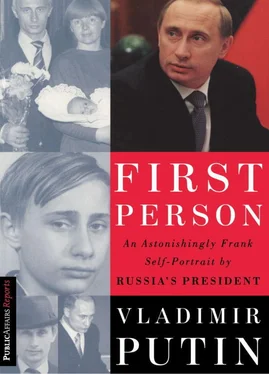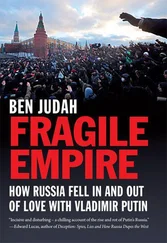Vladimir Putin - First Person
Здесь есть возможность читать онлайн «Vladimir Putin - First Person» весь текст электронной книги совершенно бесплатно (целиком полную версию без сокращений). В некоторых случаях можно слушать аудио, скачать через торрент в формате fb2 и присутствует краткое содержание. Город: New York, Год выпуска: 2000, ISBN: 2000, Издательство: PublicAffairs, Жанр: Биографии и Мемуары, Политика, Политика, Публицистика, на английском языке. Описание произведения, (предисловие) а так же отзывы посетителей доступны на портале библиотеки ЛибКат.
- Название:First Person
- Автор:
- Издательство:PublicAffairs
- Жанр:
- Год:2000
- Город:New York
- ISBN:978-0-786-72327-0
- Рейтинг книги:3 / 5. Голосов: 1
-
Избранное:Добавить в избранное
- Отзывы:
-
Ваша оценка:
- 60
- 1
- 2
- 3
- 4
- 5
First Person: краткое содержание, описание и аннотация
Предлагаем к чтению аннотацию, описание, краткое содержание или предисловие (зависит от того, что написал сам автор книги «First Person»). Если вы не нашли необходимую информацию о книге — напишите в комментариях, мы постараемся отыскать её.
First Person — читать онлайн бесплатно полную книгу (весь текст) целиком
Ниже представлен текст книги, разбитый по страницам. Система сохранения места последней прочитанной страницы, позволяет с удобством читать онлайн бесплатно книгу «First Person», без необходимости каждый раз заново искать на чём Вы остановились. Поставьте закладку, и сможете в любой момент перейти на страницу, на которой закончили чтение.
Интервал:
Закладка:
For a year, they put pressure on me every day. That only increased my desire to go to law school. But why law school? Let me explain.
In order to find out how to become a spy, sometime back around the beginning of the ninth grade, I had gone to the office of the KGB Directorate. A guy came out and listened to me. “I want to get a job with you,” I said. “That’s terrific, but there are several issues,” he said. “First, we don’t take people who come to us on their own initiative. Second, you can come to us only after the army or after some type of civilian higher education.”
I was intrigued. “What kind of higher education?” I asked. “Any!” he said. He probably just wanted to get rid of me. “But what kind is preferred?” I asked. “Law school.” And that was that. From that moment on, I began to prepare for the law faculty of Leningrad University. And nobody could stop me.
But my parents and my coaches tried. They threatened me with the prospect of the army for a long time. What they didn’t understand was that the army suited me just fine. Of course it would have slowed my progress a little, but it wouldn’t deter me from my decision.
The coaches, however, had more tricks up their sleeves. When I went to enroll in preparatory classes at the university, I learned that they had made up lists of athletes who were to be given priority in university admissions. I knew for a fact that I wasn’t on any list. But when I was enrolling in classes, my gym teacher tried to force me to join the Burevestnik Club. I asked him, “How come I have to switch over to this?” And he said, “We helped get you into the university, so please be so kind…” I knew something was up.
I went to the dean. I walked in and and told him outright, “I’m being forced to transfer into Burevestnik. I don’t think I should do that.” And the dean, Prof. Alekseyev, a kindhearted, good man, said, “Why are they forcing you?” And I said, “Because they supposedly helped me, as an athlete, to get into the university, and now I must pay them back by joining Burevestnik.”
He said, “Really? That can’t be! Everyone gets into this university on equal terms, judged according to their knowledge, not by some list of athletes. Wait a minute, and I’ll find out.” Then he reached into his desk, got a list out, glanced at it, and asked me my last name. “You’re not on the list,” he said, “So you can safely tell everybody to get lost.” Which I did.
Nevertheless, in intervarsity championships I played on behalf of the university team, as I could do this without transferring from one sports club to the other. Still, the coaches didn’t let up their efforts to recruit me. I told them a hundred times that I would not leave Trud—all my friends were there, and my first coach. I said I would never join another club. I would play for the one I wanted.
Part 3
THE UNIVERSITY STUDENT
Putin studies hard at the university, but still finds time to cruise Leningrad in his Zaporozhets car and compete in judo tournaments. Over the summer he works in construction with his buddies. He has romances and breakups, but his primary passion remains intact: finding a way into the KGB.
Was it hard to get into university?
Yes, it was, because there were 100 slots and only 10 of them were reserved for high school graduates. The rest were for army guys. So for us high-schoolers, the competition was fierce; something like 40 kids per slot. I had gotten a B in composition but A’s in all my other subjects, and I was accepted. By the way, at that time, they didn’t take into account the total grade point average of the applicant. So in tenth grade I could completely devote myself to the subjects that I would have to pass to get into university. If I hadn’t dropped the other subjects, I wouldn’t have gotten in.
Thank God, we had very smart teachers with sharp tactics in our school. Their main goal was to prepare students to get into college. And as soon as they realized that I wasn’t going to become a chemist and wanted to major in the humanities, they didn’t interfere. In fact, quite the opposite—they approved.
You evidently studied hard in university, with your future in mind?
Yes, I studied hard. I didn’t become involved in any extracurricular activities. I wasn’t a Komsomol functionary.
Was your stipend enough to cover your living expenses?
No, it wasn’t enough. At first, my parents had to support me. I was a student, and didn’t have any money. I could have earned extra money working construction like a lot of people. But what would have been the point? I was on a construction crew once. I went to Komi, where I chopped trees for the lumber industry and repaired houses. I finished the job and they handed me a packet of money, probably about 1,000 rubles. In those days, a car cost 3,500 or 4,000 rubles. But for a month and a half of work, we got 1,000! So it was good money. Actually, fantastic money.
We earned our pay. And then we had to spend it on something. My two friends and I went to Gagry on vacation without even stopping back in Leningrad. We got there, and on the first day we got drunk chasing shish kebabs down with port wine. Then we tried to think of what to do next. Where could we go to spend the night? There were probably some hotels around, but we didn’t have much hope of getting into them. Late at night, we finally found an old lady who agreed to take us in and give us a room.
We spent several days swimming, tanning, and getting good rest. But soon we had to get out of there and somehow get back home. We were running out of money. We came up with a plan; we would finagle places on the deck of a steamship on its way to Odessa. Then we would take a train to Peter, buying tickets for the top bunks in the sleepers, which were the cheapest.
We pooled our pocket change and realized we had nothing but a few kopecks left for provisions. We decided to buy some tushonka , some canned stew, for the trip. One of the fellows was rather careful—he had more money left over than the other, who was a spendthrift. When we told the more economical friend that he should share his dough, he thought for a minute and then said, “That canned meat is pretty hard on the stomach. That’s not really the right thing to get.” And we said, “Whatever you say. Let’s get going.”
When we got down to the docks, a huge crowd had gathered. The ship was giant as well—a beautiful white ocean-liner. We were told that only passengers with tickets to the cabins were being allowed on, and those with deck seats were not yet being admitted. All the deck passengers had little tickets made out of hard cardboard, but we had larger-sized, mixed-passage tickets that looked like the ones first-class passengers would have had.
My friend who had refused to chip in for the canned meat said, “You know, I don’t like the look of this. I don’t think it’s going to work out. Let’s try to get on right now.” I said, “It’s awkward, let’s just stand here and wait our turn.” He said, “Well, you can stand around if you want. We’re going to get on.” So they went to board the ship, and of course I ran after them.
The ticket-taker asked us what kind of tickets we had. “We have the big ones,” we answered. He waved us on.
So we were let on board the ship with the first-class passengers. And then the foreman or somebody else yelled, “Are there any others for first class?” The crowd on the dock was silent.
He asked once again, “Are there only deck passengers left?” The crowd, hoping they would now be allowed on, cried out excitedly, “Yes, just deck passengers!” To which he shouted, “Raise the plank!”
They lifted the walkway, and suddenly panic broke out on the dock. People were furious. They had been deceived. They had paid money, and now they weren’t being let on the ship. Later they were told that there was a freight overage and that the ship was full.
Читать дальшеИнтервал:
Закладка:
Похожие книги на «First Person»
Представляем Вашему вниманию похожие книги на «First Person» списком для выбора. Мы отобрали схожую по названию и смыслу литературу в надежде предоставить читателям больше вариантов отыскать новые, интересные, ещё непрочитанные произведения.
Обсуждение, отзывы о книге «First Person» и просто собственные мнения читателей. Оставьте ваши комментарии, напишите, что Вы думаете о произведении, его смысле или главных героях. Укажите что конкретно понравилось, а что нет, и почему Вы так считаете.












